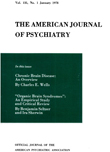Normetanephrine Excretion and Affective State in Depressed Patients Treated with Imipramine
Abstract
Urinary excretion of normetanephrine, the metabolite of norepinephrine which may reflect noradrenergic activity, showed a gradual increase during the period of definitive clinical improvement in depressed patients treated with imipramine. These and other findings of the study suggest that noradrenergic activity may gradually increase during clinical improvement from depression, and that noradrenergic activity may be relatively decreased in retarded depression and increased in mania. The pharmacological action of imipramine may initiate increases in noradrenergic activity and clinical improvement, in depressed patients, that are subsequently maintained after discontinuation of the drug.
Access content
To read the fulltext, please use one of the options below to sign in or purchase access.- Personal login
- Institutional Login
- Sign in via OpenAthens
- Register for access
-
Please login/register if you wish to pair your device and check access availability.
Not a subscriber?
PsychiatryOnline subscription options offer access to the DSM-5 library, books, journals, CME, and patient resources. This all-in-one virtual library provides psychiatrists and mental health professionals with key resources for diagnosis, treatment, research, and professional development.
Need more help? PsychiatryOnline Customer Service may be reached by emailing [email protected] or by calling 800-368-5777 (in the U.S.) or 703-907-7322 (outside the U.S.).



